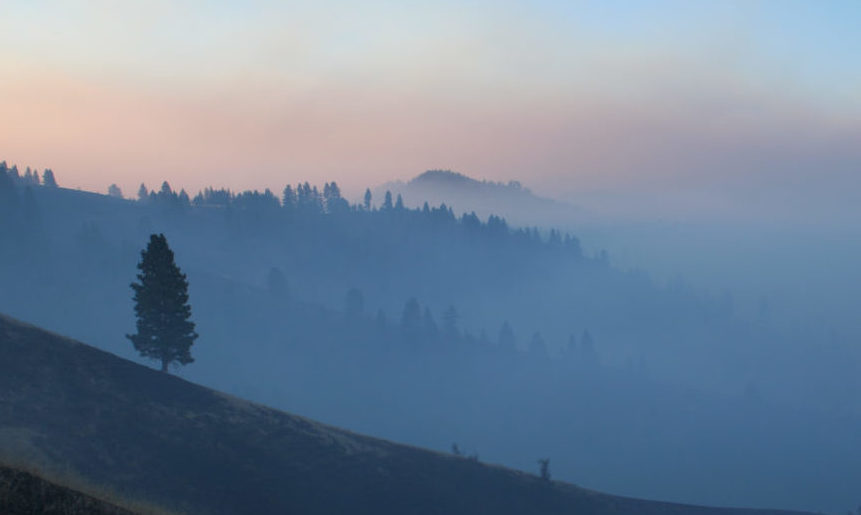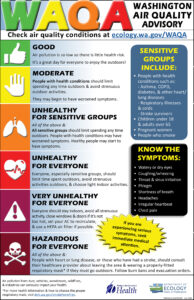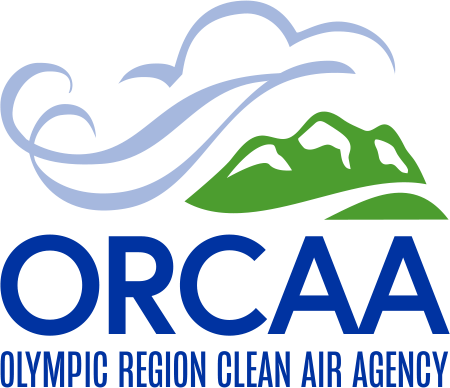
While much of western Washington – including most areas within ORCAA’s six-county jurisdiction – feels a brief respite today from intense wildfire smoke, it’s likely that smoke will return to the region by Friday and linger throughout the weekend.
The National Weather Service (NWS) forecasts winds to shift from northeasterly flows to more southwesterly by Friday, which will bring smoke from the Oregon wildfires into western Washington. The NWS has extended an Air Quality Alert for all of Washington state through noon, Monday. In addition to new smoke from the ongoing fires, a huge plume of smoke sits just off the Oregon coast, pushed out over the Pacific by the off-shore winds earlier this week. The new westerly winds could push that smoke plume right into ORCAA’s counties. See the animation below.
Graphic by National Weather Service, Spokane office
Air Quality throughout the region could move into Moderate or Unhealthy for Sensitive Groups by Friday evening, though some areas could see even worse impacts.
According to the Washington Department of Health (DOH), residents in areas rated as Unhealthy for Sensitive Groups should limit spending any time outdoors and should avoid strenuous outdoor activities. All sensitive groups – for instance, anyone with asthma or other respiratory conditions, seniors, and children – should limit spending any time outdoors. People with health conditions may have worsened symptoms. Healthy people may start to have symptoms.
In areas with a WAQA rating in the Unhealthy range everyone, especially sensitive groups, should limit time spent outdoors, avoid strenuous activities outdoors, and choose light indoor activities.
Detailed information from DOH on how residents can best deal with wildfire smoke impacts. That information can be found here: https://www.doh.wa.gov/CommunityandEnvironment/AirQuality/SmokeFromFires
What can I do to protect myself and my family from outdoor smoke?
- CURTAIL ALL BURNING! To reduce smoke, avoid creating any fires, including recreational fires. Every county of the state has some level of fire-safety burn ban and most ban all forms of outdoor burning, including recreational fires. But even where legal, recreational fires should NOT be ignited until fire and air quality conditions improve.
- Check local air quality reports and listen to news or health warnings for your community.
- Avoid physical exertion outdoors if smoke is in the air.
- If you have asthma or other lung diseases, make sure you follow your doctor’s directions about taking your medicines and follow your asthma management plan. Call your health care provider if your symptoms worsen.
- Stay indoors and keep indoor air as clean as possible. Take the following steps when indoors:
- Keep windows and doors closed. Track the air quality and open your windows for fresh air when the air quality improves. Pay attention to the heat indoors and follow the guidance in the section below if it’s too hot.
- Run an air conditioner, set it to re-circulate, and close the fresh-air intake. Make sure to change the filter regularly.
- Use an air cleaner with a high-efficiency particulate air (HEPA) filter to reduce indoor air pollution. A HEPA filter will reduce the number of irritating fine particles in indoor air. A HEPA filter with charcoal will help remove some of the gases from the smoke. Do not use an air cleaner that produces ozone. See California’s air cleaning devices for the home fact sheet (PDF).
- Don’t add to indoor pollution. Don’t use food broilers, candles, incense, fireplaces, or gas stoves. Don’t vacuum unless your vacuum has a HEPA filter, because vacuuming stirs up particles already inside your home. Don’t smoke, because smoking puts even more pollution into the air.
- Consider leaving the area if the air quality is poor and it’s not possible to keep indoor air clean, especially if you or those you are caring for are having health problems or are in a sensitive group.
Washington’s complete network of Air Monitoring Stations — including those managed and maintained by ORCAA — and the direct impacts of wildfire smoke can be found here: https://fire.airnow.gov/
Additional information on wildfires and smoke from wildfires is available at http://wasmoke.blogspot.com/
ORCAA will continue to monitor this possible smoke event and will report any changes of note.
